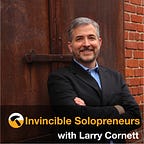
One of my author friends recently announced:
“Well, it finally happened. I’m making more money from my books than I do in my day job. I guess it’s time to quit and go all in on my writing!”
Ok, I’ll admit that I felt a brief twinge of jealousy before congratulating them. Writing fiction for a living was — and probably still is — my vision of an ideal job and lifestyle. I wanted the independence, freedom, and flexibility of deciding how I spent my days, when I scheduled working sessions, and where I spent that time writing (I always pictured a cabin in the woods). I had always admired my favorite childhood authors and dreamed of being like them one day.
However, my life went down a different path.
I thought I had to study engineering in college to have a “respectable career” later.
But I didn’t enjoy it.
Then, I changed majors and graduated with a degree in Psychology.
But I couldn’t find a good job.
Went to graduate school, focused on human-computer interaction, and got my Ph.D.
So, I began a successful career in the Silicon Valley tech industry.
Woke up about 20 years later and realized I was unhappy, unhealthy, and unfulfilled.
So, I left my tech career behind and started my own business as a coach and consultant.
Making a living doing more of what you love and less of what you hate is possible. I have friends who are doing it, and I have been doing it for over 12 years now.
I’m finally enjoying what I do for a living, working with great people, owning my schedule, deciding where I work, living where I want to live, taking care of my health, and just generally happy with my life!
Now, I’m finally coming full circle and returning to writing, too. I’m even working on some fiction. Who knows? Writing might be my “3rd Act career” (after I actually retire).
Of course, I’m not saying that everything is blissful and easy. Work is still work! I work hard, and I wouldn’t say that running my business is easy. But the big difference is: I don’t hate it! There are many days that I truly love what I do. And I’m seriously addicted to the freedom it gives me.
I’m not part of the camp that believes you must follow your passion to be happy with your work. But I’m also not part of the crowd that gives up and says, “Hey, work sucks. That’s reality. Just find a job to pay the bills and enjoy your life on the weekends.”
No thank you!
Life is too short to only enjoy your weekends, live with dread every Sunday evening, and feel depressed when you start work on Monday morning. Why should you spend every Monday through Friday doing something you don’t enjoy?
It may not be easy to find a way to make a living doing more of what you love and less of what you hate. But it is possible, and it is worth it!
My author friend is now doing it.
As I said, I’m doing it.
And you can make it happen, too.
Imagine a different future
What if you no longer had a boss telling you what to do?
What if you could start doing more of what you love to make a living?
Can you imagine a life where you no longer have to do things you dislike to get paid?
When we need money from someone else, we get stuck in a bad dynamic. We can’t say “No” when we’re afraid of losing our jobs. That’s especially true during tough economic times like right now.
For many years, I was chasing titles and income. But, the more money I made, the more our lifestyle expenses grew. Gotta love that Silicon Valley "keeping up with the Joneses" life.
So, I felt trapped. I was stuck.
I had to keep my job, keep making money, and put up with a life that was making me miserable so we could pay our mortgage, cover our expenses, and take care of my family. My health wasn’t the greatest, my stress and anxiety were at an all-time high, and things weren’t getting better, so I knew something had to give.
We finally said enough of that and drastically downsized. We sold our house in the Bay Area, moved somewhere we love, and live more simply. I could support my family on my solopreneur business income because we pushed our burn rate line (i.e., our monthly expenses) below my income line.
I was free. I never had to return to a 9-5 job again.
So, now I get to spend my days writing (which I love), podcasting (which I love), and working with great clients (whom I love spending time with).
And I spend several hours every day with my family, working out, going for walks and runs, skiing, etc.
I haven't had to do anything I hate for work in over 12 years. It’s a pretty amazing feeling!
Now, I want you to imagine your ideal future.
What could your life be like if you loved the work you do?
Where would you live if you no longer had an employer?
How would you spend your days if you were in complete control of your time?
What would you do with the time you recovered from eliminating a daily commute?
With whom would you spend your time if you no longer had to spend your days with a boss and coworkers?
Create a vision board if it helps you see it more clearly. Creating a vision for your ideal future isn’t a waste of time or some fantasy exercise. When you set your intention, you set things in motion. You will see new opportunities that you would have missed before.
Once you have a clear vision for what you want your working and personal life to be, go deeper:
Create goals.
Make a plan.
Set a timeline for making it happen.
Build an annual and monthly roadmap for the work you need to do.
Change your daily and weekly habits to chip away at the roadmap to make your vision become a reality.
Write your love/hate lists
If you already know exactly what it is you’d rather be doing, great! You have an idea for your business. Now, you just need a strategy and a plan to execute it.
However, if you’re not sure what it means to “do more of what you love and less of what you hate,” it’s time to create lists of activities to make it clear. I often have my career clients do this exercise when they want to find a much better job or change careers entirely. But the ultimate career change is building your own business and having the opportunity to define your own job!
As you go about your day for the next few weeks, pay attention to your work and life activities, and start capturing the following lists:
What do you notice that you are good at doing? You already have the talent, skills, knowledge, and experience required to excel at these tasks.
What do you not seem to do very well? Note: this could be because you haven’t really learned how to do them, you need more experience, or perhaps you don’t actually enjoy the tasks or care about the work.
What do you seem to enjoy doing? Note: you may find yourself repeating some items from lists 1 and 2 here, and that’s ok. There’s a difference between how well you do something and how much you like doing it.
What do you hate doing and never want to do again? Pay special attention to this list. These are tasks and activities you want to eliminate from your working life.
What do you wish you could start doing (or do more of)? This is aspirational. What have you always dreamed of spending more time doing in your working life?
By the end of the next few weeks (e.g., 2-4 weeks), you should have some pretty long lists of tasks and activities that you love and hate. If any of the items are high-level or vague, try to break them down into more specific details.
For example, I’ve had clients tell me, “They love design.” But what does that mean? What do they mean by “design”?
I asked them to break down the high-level topic of design into more detailed subtasks and activities, so we could be clear about what they loved about the process. As we did this, we discovered that they loved some parts of design (e.g., brainstorming, collaborative whiteboard sessions, and prototyping) but really disliked other design activities (e.g., creating mockups for all use cases, writing detailed design specifications, generating endless revisions).
Your lists can now be used to define your “ideal job.” As a solopreneur, you get to build the business of your dreams and your role within that business. This is your opportunity to write your own job description and fill it with the responsibilities you enjoy, the activities you love, and the work you’re great at doing!
Describe your ideal job
Let’s have some fun with this. I usually ask aspiring entrepreneurs to:
Describe their ideal customers.
Capture the problems those customers are having.
Create a solution for those problems.
Define their ideal business.
Create a profitable business model and plan.
Etc.
But I want to approach this exercise from a different angle.
If you could write a perfect job description that lets you do the work you’re great at doing and love doing but none of the work you hate, what would that look like? How would you start your morning? How would you spend your days? What is your ideal work schedule for the week?
Once you have this job description, let’s talk about how this person would get paid (this person is you, by the way 😉).
Who needs the work this person can perform?
Who would pay for it?
How much would they pay for it?
How could they up-level the value delivered and get paid even more?
I saw a recent conversation about two solopreneurs who had similar businesses but approached their product and service offerings very differently.
One only provided 1-on-1 consulting services and was making about $70K/year. There was a hard limit on how many clients they could take on, with only 24 hours a day and seven days in a week.
The other solopreneur did some 1-on-1 consulting too, but also sold self-serve access to digital downloads and systems that let customers leverage that solopreneur’s knowledge to solve their own problems. Since this was scalable, the second entrepreneur was making about $350K/year.
The point of sharing this story is I want you to be creative with your ideal job description. Don’t artificially limit yourself to the way your work was performed in the past for an employer. This is your chance to set yourself free and work how you want, when you want, where you want, and with whom you want.
You get to call the shots!
Test, scale, and set yourself free
You’ll notice that my author friend didn’t quit their day job until it was obvious they could make a living from their books. They wrote a little in the morning before work, wrote some more in the evenings, and carved out a few hours for dedicated writing time on the weekends.
It took about four years of writing on the side, building up their list of books for sale, testing and improving their marketing, and watching their income slowly but surely increase.
Four years of hard work.
Four years of patience.
Four years of loving the work of writing, though.
It was worth it for them because they love publishing books! They could see the light at the end of the tunnel: the day they could quit a job they hated and make a living doing what they wanted to be doing instead.
Making a living as a writer isn’t a slam dunk for 99% of authors. That business is a different beast than the path most of us solopreneurs take. If you follow my model of turning your ideal job description into a business plan, your path to profitability should be much shorter.
As I’ve shared before, my first solopreneur business replaced my 9-5 job income almost immediately. I launched my little design agency in about a day after my layoff, started working for my first client right away, and invoiced them about two weeks later. So, I had enough money in the bank to support my family in that first month of business vs. my writing friend, who had to wait almost four years.
You can design and test your business model while you’re still employed (of course, check your employment agreement and local laws). That’s the safest approach. You’re essentially using your current paycheck to fund your solopreneurial exploration. You are your own investor!
Finding real customers will help you validate if what you offer provides enough value for them to purchase it. Once you have happy customers, repeat business, and you know it’s working, it’s time to start scaling your business to increase that income stream.
When you’re making enough that you know you could make a living if you were running your business full-time, you’re ready to cut ties with your old job and set yourself free!
I can’t even begin to describe how much better work will feel when you control what you do (or don’t do), the clients you accept, and how you spend your days. Life is just better when you enjoy how you make a living!
As I’ve mentioned in earlier posts, I am planning a live workshop to dive into the details of designing and launching a solopreneur business. It will be an interactive session, so you can get your questions answered. Let me know if you’re interested!
Larry Cornett is a leadership coach and business advisor. If you’re interested in starting your own business or side hustle someday (or accelerating an existing one), check out his “Employee to Solopreneur” workshop and community (launching soon).
Larry lives in Northern California near Lake Tahoe with his wife and a gigantic Great Dane. He does his best to share advice to help others take complete control of their work and life. He’s also on Mastodon.












